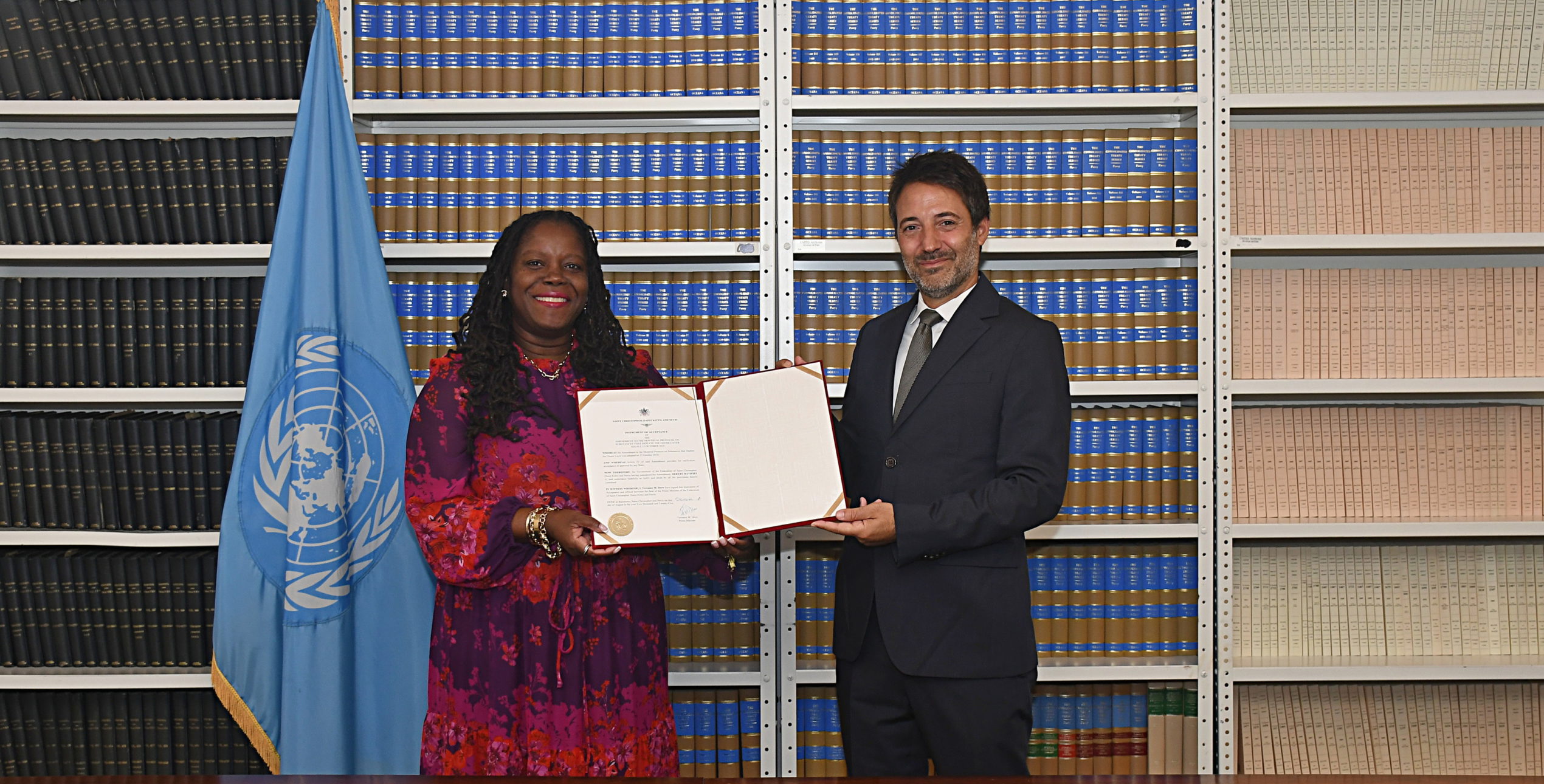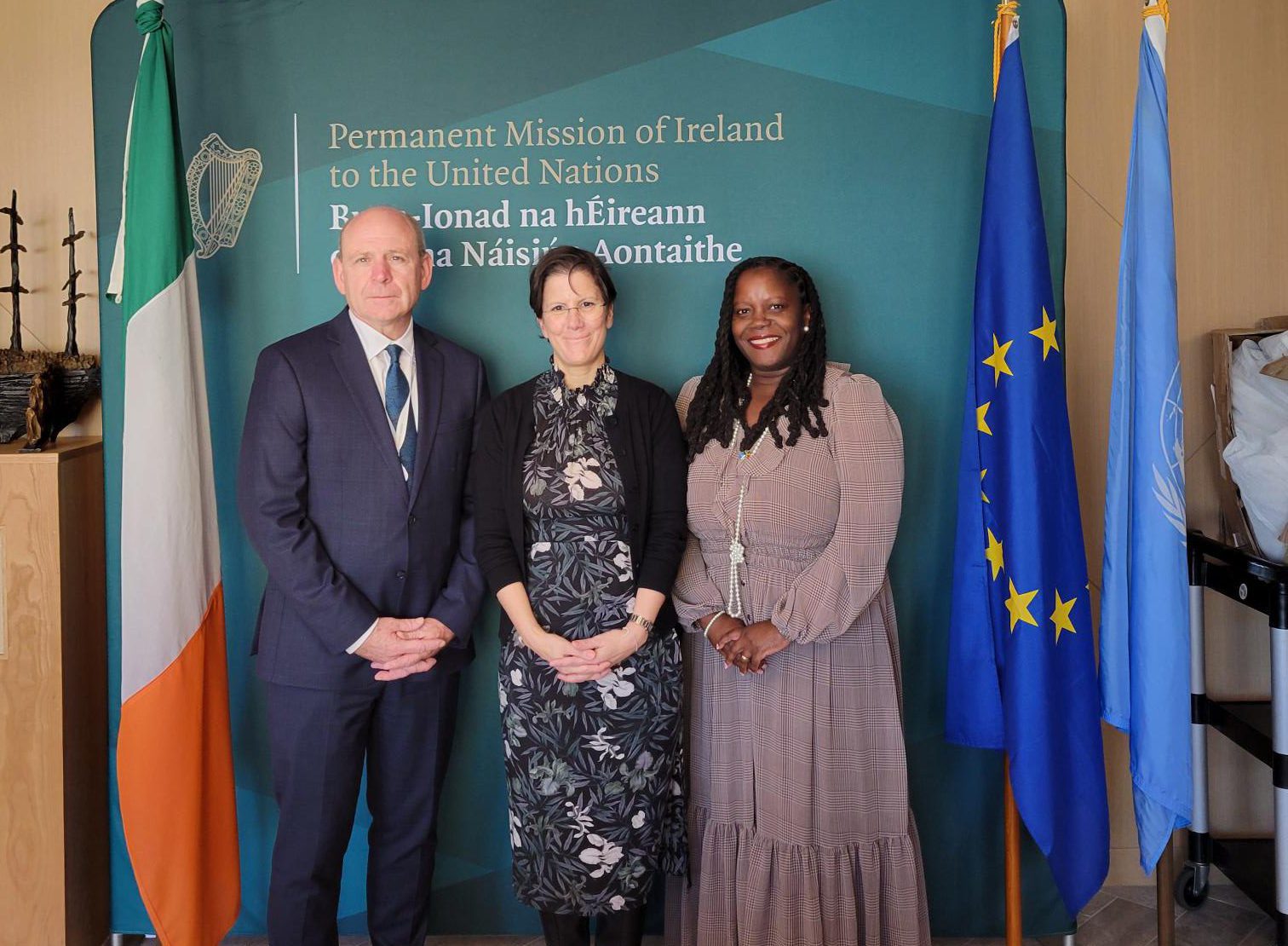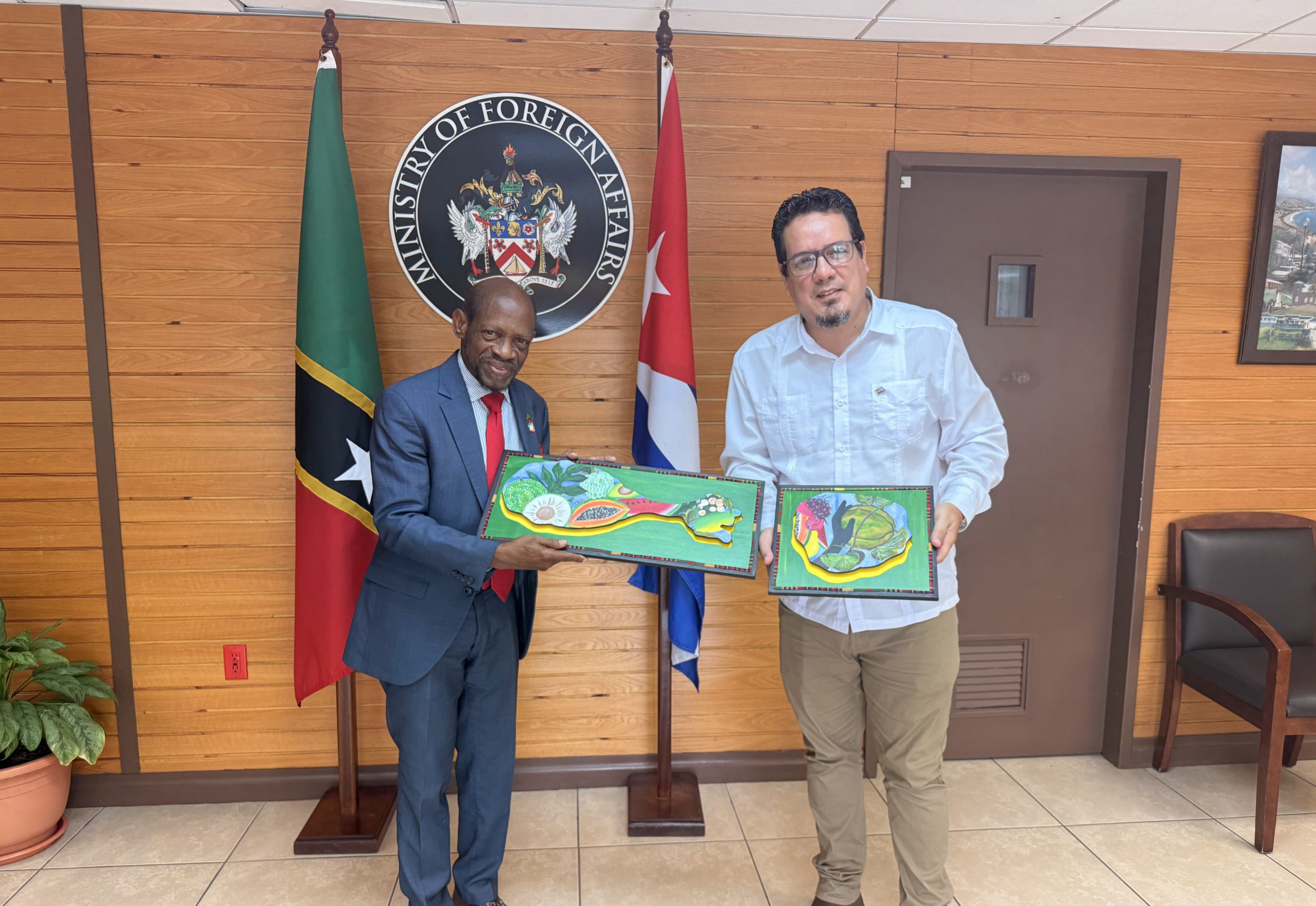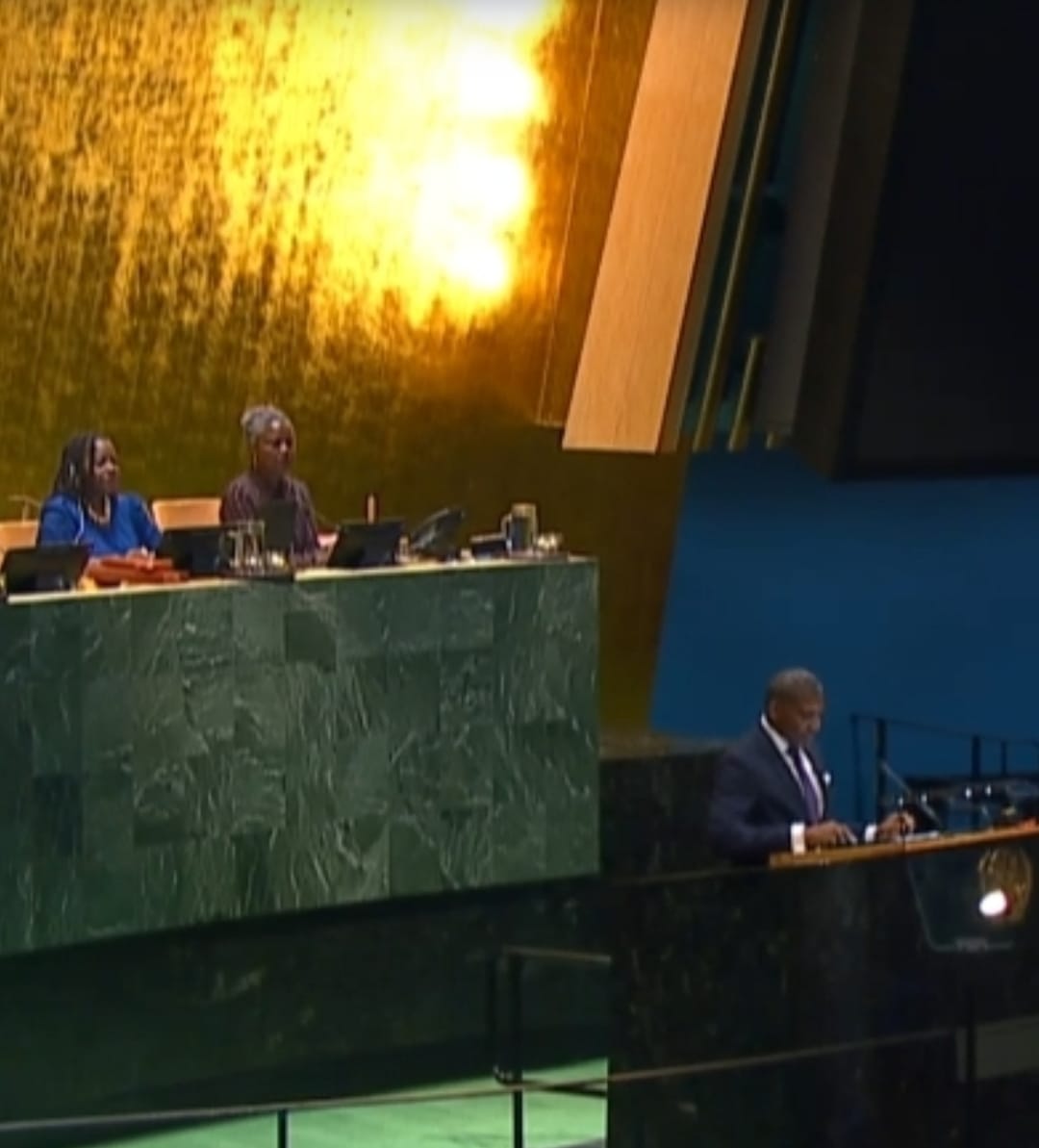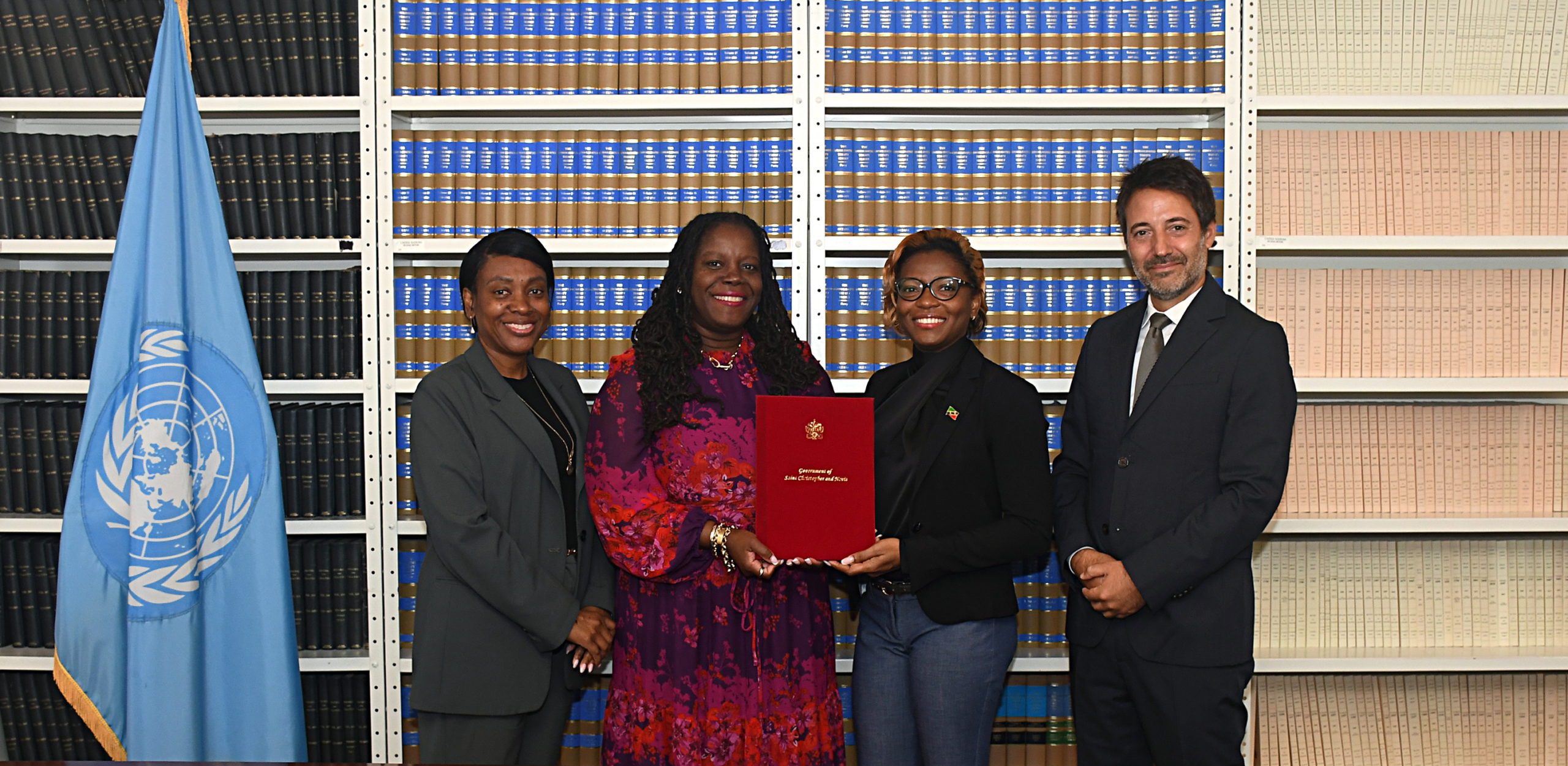
United Nations, New York (5 September 2025) – On 29 August 2025, in a brief yet monumental ceremony at the United Nation’s Treaty Office in New York, Saint Kitts and Nevis deposited its instruments of acceptance for the Biodiversity Beyond National Jurisdiction (BBNJ) Agreement. The official document was deposited by Saint Kitts and Nevis’ Permanent Representative and Ambassador to the UN, Dr. Mutryce Williams.
Joining Ambassador Williams in presenting the ratified treaty to the Chief of Treaty Section of the United Nations Office of Legal Affairs David Nanopoulos were Ms. Maritza Queeley, National BBNJ Focal Point and Port State Control Officer in the Department of Marine Resources and Third Secretary, Mrs. Lecia Phipps of the Permanent Mission of Saint Kitts and Nevis to the UN.
Ambassador Williams said, “Depositing this instrument formally completes the ratification process of the treaty and reinforces our nation’s commitment to the protection of marine biodiversity and the sustainable use of ocean resources, even beyond its territorial waters.”
She continued, “A debt of gratitude is owed to Ms. Maritza Queeley, National BBNJ Focal Point and Port State Control Officer in the Department of Marine Resources who has committed several years to this process. Consultations, discussions and formal negotiations for the BBNJ Agreement took about twenty years. The Mission’s lead on BBNJ, Counsellor Sonia Boddie-Thompson ought to be commended for her work as well. Arriving at ratification has truly been a collaborative effort amongst several ministries, with the Honourable Prime Minister Dr. Terrance Drew at the helm, wanting to ensure that Saint Kitts and Nevis is at the forefront of this Agreement.”
Ambassador Williams shared, “Prime Minister Drew recognizes the unique vulnerabilities to climate change and ocean degradation that small island developing states face and realized that the BBNJ Agreement provides a framework for equitable benefit sharing from the ocean’s resources. He realized that the Agreement enhances access to capacity building and technology, and most importantly it gives SIDS such as Saint Kitts and Nevis a stronger voice in the governance of marine biodiversity in areas beyond national jurisdiction, and so he pushed for the ratification.”
The Agreement under the United Nations Convention on the Law of the Sea on the Conservation and Sustainable Use of Marine Biological Diversity of Areas beyond National Jurisdiction (BBNJ Agreement) was adopted on 19 June 2023 by the Intergovernmental Conference on Marine Biodiversity of Areas Beyond National Jurisdiction convened under the auspices
of the United Nations. The BBNJ Agreement becomes the third implementing agreement to the United Nations Convention on the Law of the Sea.
According to the UN, “The Agreement addresses four main issues:
- Marine genetic resources, including the fair and equitable sharing of benefits;
- Measures such as area-based management tools, including marine protected areas;
- Environmental impact assessments; and
- Capacity-building and the transfer of marine technology.”
The Agreement also addresses several “cross-cutting issues”, establishes a funding mechanism and sets up institutional arrangements, including a Conference of the Parties and various subsidiary bodies, a Clearing-House Mechanism and a secretariat.
The Agreement is open for signature by all States and regional economic integration organizations from 20 September 2023 to 20 September 2025 and will enter into force 120 days after the date of deposit of the sixtieth instrument of ratification, approval, acceptance or accession.
Background on BBNJ by the United Nations Environment Programme (UNEP)
The BBNJ Agreement significantly strengthens the legal framework for the conservation and sustainable use of marine biodiversity in areas beyond national jurisdiction and will enter into force 120 days after sixty states have completed procedures to become Parties to the Agreement.
Nearly two-thirds of the ocean lies beyond national jurisdiction of any single country. These international waters begin where a nation’s Exclusive Economic Zone (EEZ) ends, typically 200 nautical miles from its coastline, and are home to a vast array of marine biodiversity, including many species yet to be discovered.
Although UNCLOS has been in force since 1994, it was developed before many of today’s scientific, technological and environmental changes. Since its adoption, complex pressures have grown and emerged, from climate change and plastic pollution to shifts in maritime activity and access, particularly in the Arctic. While much has changed, the legal framework for governing areas beyond national jurisdiction has remained largely the same until the adoption of the BBNJ Agreement. The BBNJ Agreement arrives at a critical time following a 20-year process of consultations, discussions and formal negotiations. This new Agreement, once in force, will provide a legally binding framework and help level the playing field for the conservation and sustainable management of biodiversity in areas beyond national jurisdiction.
******




